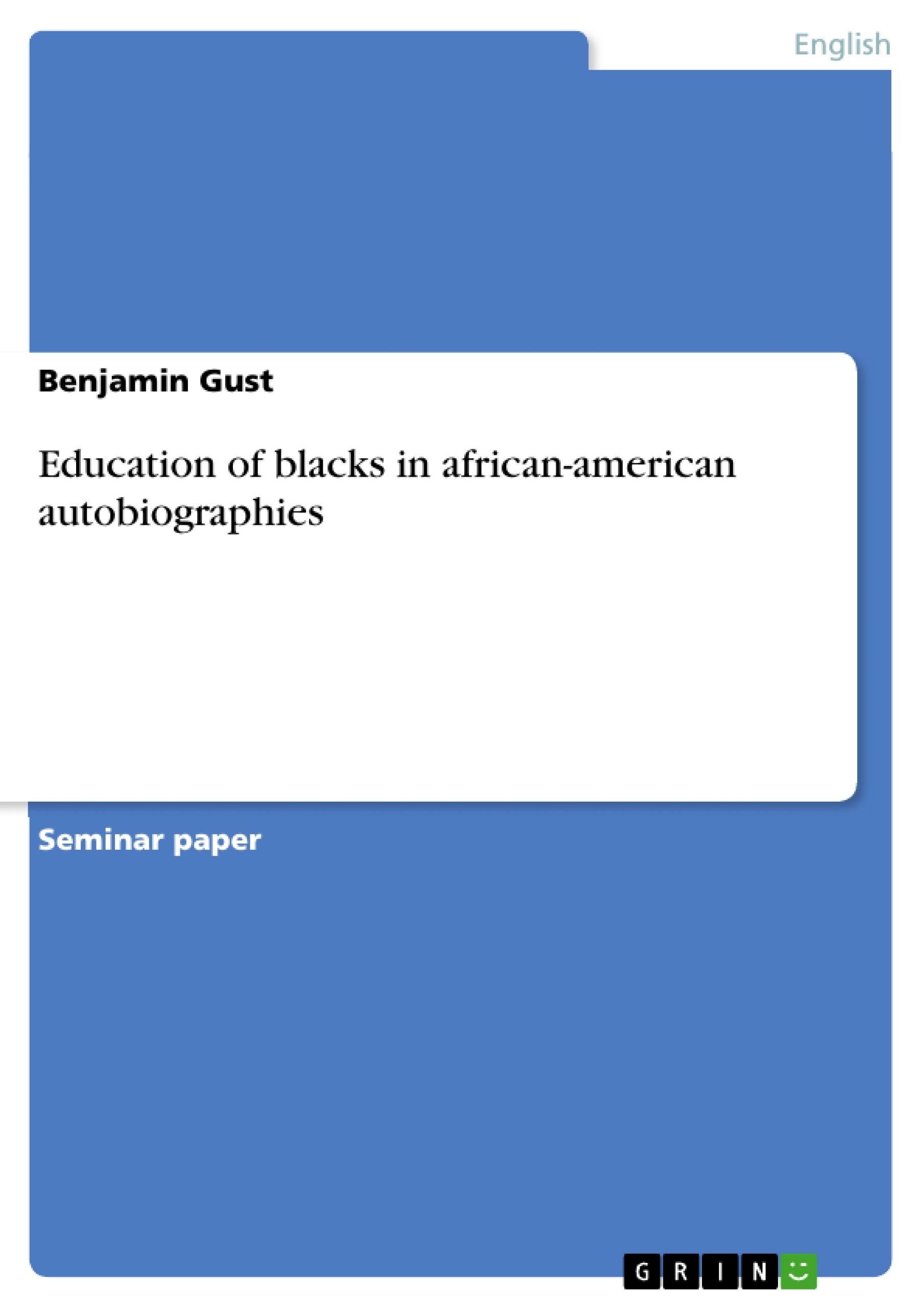When reading African-American autobiography one is likely to notices that there are several recurring themes. One might conclude that these are issues of special interest to the authors. A major topic that occurs in a number of autobiographies is that of education. This paper will try to analyze the role of education in the process of the emancipation of the black race.
Before one looks at what can be found about the issue of education of blacks in African-American autobiography one should be familiar with the historical and cultural context in which it occurs. This is why the paper will try to provide a brief historical overview of the development of education in America at the times before, during and after the civil war.
After having established the historical background the paper will try to trace the occurrences of the theme of education in the autobiography of Booker T. Washington and the thesis The Talented Tenth by W.E.B. Du Bois and illustrate its importance to the authors. In doing so an attempt will be made to present the reasons and intentions of the authors that made them deal with education during their lives.
Special attention will be paid to the efforts of Booker T. Washington to establish a schooling system for blacks as well as to Du Bois’ concept of the ‘Talented Tenth’ and its reasons. Although both were actively sought to improve the education of African Americans and thereby their social status they did not share the same concepts of how this were to be achieved and they pursued different educational policies. The two approaches will be analyzed and compared to each other. Finally a conclusion will be drawn assessing the importance of their achievements in the ongoing fight of African Americans for equal rights and equal chances.
Inhaltsverzeichnis (Table of Contents)
- Introduction
- Historical Overview
- Education in the Autobiography of Booker T. Washington
- Different Concepts of Black Education
- Booker T. Washington's Idea of Black Education
- W.E.B. Du Bois and the Concept of The Talented Tenth
- Comparison of Du Bois' and Washington's Educational Policies
- Works Cited
Zielsetzung und Themenschwerpunkte (Objectives and Key Themes)
This paper examines the role of education in the emancipation of the Black race as depicted in African-American autobiography. It explores the historical context of education in America before, during, and after the Civil War, analyzing the themes of education in Booker T. Washington's autobiography and W.E.B. Du Bois's "The Talented Tenth." The paper seeks to understand the authors' motivations for addressing education and their contrasting approaches to achieving educational equality for African Americans.
- The significance of education in the emancipation of the Black race.
- The historical development of education for Blacks in America.
- The contrasting educational philosophies of Booker T. Washington and W.E.B. Du Bois.
- The impact of Washington's and Du Bois's educational policies on the Black community.
- The ongoing struggle for equal rights and chances for African Americans.
Zusammenfassung der Kapitel (Chapter Summaries)
- Introduction: The paper introduces the recurring theme of education in African-American autobiography and its significance in the context of racial emancipation. It outlines the paper's approach, focusing on the historical overview and the analysis of Booker T. Washington's and W.E.B. Du Bois's perspectives on education.
- Historical Overview: This chapter explores the limited access to education for Blacks in the South before the Civil War. It highlights the establishment of "Freedmen's schools" after the abolition of slavery and the challenges faced by these schools, including insufficient funding and limited accessibility. Despite these challenges, the overall number of illiterate Blacks decreased significantly between 1870 and 1890.
- Education in the Autobiography of Booker T. Washington: This chapter delves into Washington's life story as described in "Up from Slavery." It emphasizes Washington's relentless pursuit of education despite the limitations imposed by his social status. The chapter highlights his early experiences with self-education, the challenges he faced in accessing formal education, and his eventual enrollment at Hampton Normal and Agricultural Institute.
Schlüsselwörter (Keywords)
The paper focuses on the keywords: African-American autobiography, education, emancipation, Booker T. Washington, W.E.B. Du Bois, The Talented Tenth, historical overview, Freedmen's Bureau, Hampton Normal and Agricultural Institute, equal rights, and equal chances.
Frequently Asked Questions
What was Booker T. Washington's philosophy on education?
Washington advocated for industrial and agricultural education. He believed that by gaining practical skills and economic self-reliance, African Americans would eventually earn the respect of white society and achieve social equality.
What is W.E.B. Du Bois's concept of the "Talented Tenth"?
Du Bois believed that the top ten percent of the Black population should receive a classical liberal arts education to become leaders who would fight for civil rights and social change for the entire race.
How did education for Blacks develop after the Civil War?
After the abolition of slavery, the Freedmen's Bureau helped establish schools. Despite limited funding and hostility, the number of illiterate African Americans decreased significantly between 1870 and 1890.
What are the main differences between Washington and Du Bois?
Washington focused on economic progress and vocational training (accommodationist approach), while Du Bois emphasized higher education, political action, and immediate civil rights (activist approach).
What is the significance of the Hampton Institute in this context?
The Hampton Normal and Agricultural Institute was where Booker T. Washington received his education; it served as the model for his own Tuskegee Institute and his focus on vocational training.
- Arbeit zitieren
- Benjamin Gust (Autor:in), 2005, Education of blacks in african-american autobiographies, München, GRIN Verlag, https://www.grin.com/document/76400



